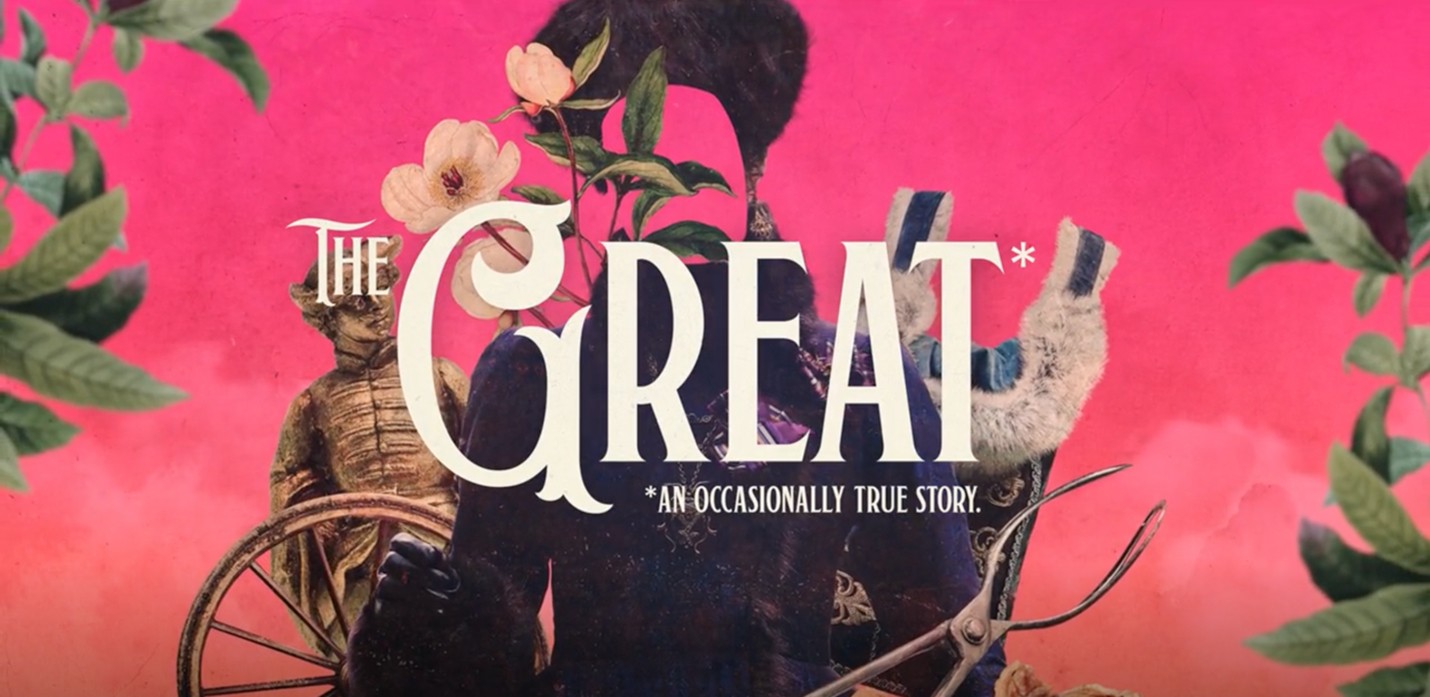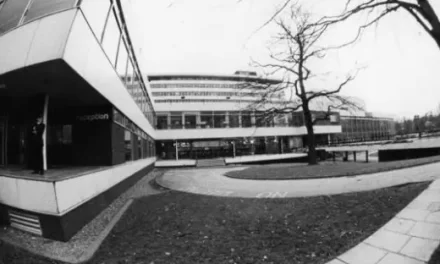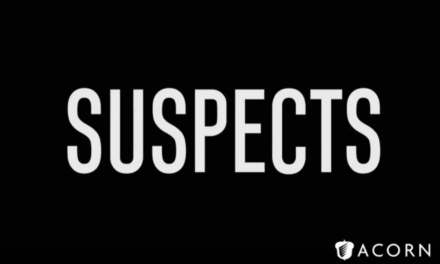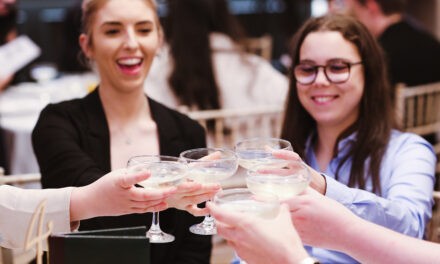As it has come to Channel 4 recently, I’d like to talk about Hulu’s The Great (2020-). It’s a bit of an oddball in the current television landscape. The Great fictionalises Catherine the Great’s rise and rule over Imperial Russia; it’s an out-and-out comedy, cramming as many laughs a minute as it can get.
The fantastic thing about The Great is that it works with, and even against, history. Hulu describes the show as deliberately “anti-historical”. Creator and showrunner Tony McNamara cares not for the smaller details – he picks and chooses what he includes, almost a fill-in-the-blank of Catherine’s history. As Robert Lloyd puts it, “And so must the viewer abandon himself to what’s on the plate without a care to learning anything useful, or even true, about Russia or any of the real people represented here.” While this will instantly summon a mob of angry historical nit-pickers, I love history, and still, I think this is a fun and original idea. The show is chock full of anachronisms and crude modern language (they all say “fuck” and “cock” about 30 times an episode). “There is always something to enjoy that’s ruder, sillier or sharper than other shows would dare to include,” Jack Seale writes. From small moments to larger events, the narrative entirely comprises of gaudy, corpulent aristocrat behaviour – and it wants you to laugh with it all the way. The more thematic modernisation is Catherine explicitly being a feminist protagonist, played charmingly by Elle Fanning. Taking this historically accurate kernel and turning it into the beating heart of the show makes The Great stand out amongst other historical fiction TV.
Catherine the Great as a figure is a divided subject for me. She was, in many ways, a great progressive, a pioneer and patron of science, art, and philosophy. She was famously in favour of freeing the ‘serfs’ (the serving class of Russia), though this would not come to fruition until her great-great grandson, Alexander II. Her girl’s school, the “Institute for Noble Maidens” (absolutely love this name) was the first of its kind. She transformed Russia into a place of cultural splendour. Her German heritage and upbringing made replicating the growing European enlightenment of the late 1700’s imperative for her. This is no extensive list of her accomplishments as empress; I’m not a historian (just a history fan).
However, on the opposite side of cultural expansion, is the very literal expansion of Russia’s empire. Catherine expands Russia’s borders into part of Poland and sets its sights on Turkey after it declares war in 1768. After many battles, Turkey surrendered in 1774, “with Russia gaining territories on the Black Sea coast and the Sea of Azov area.” Controlling ports around the Black Sea ensured a massive boost in power and economic growth. Most of her lovers were associated with the Russian military in some capacity; perhaps the most famous include Orlov and Potemkin. She effectively sent them off at her pleasure for expansion, glory – the usual reasons. While writing this, the comparison to modern political events did jump at me – but I’m going to put that cat back in the bag (though feel free to break your own comparisons).
Updating Catherine’s story – however fictionalised – to the modern era brings her progressive nature alongside her belief in absolute autocracy into startling contrast. The same has always struck me about ITV’s Victoria (2016-2019). The veneration of these royal idols, and the show’s unwillingness to showcase the good and bad says much. Here, though, I wouldn’t say The Great actively avoids it: “Is it not an irony of ironies, that you, who says she hates killing, is sending thousands to their deaths (…)?” (S2E9). It’s more that Catherine’s ambition for conquering and expansion are viewed as admirable traits, an extension of her #girlboss persona, which creates more problems with this outlook than it solves. You’re rather encouraged to root for her in The Great. The moral ambiguity of her involvement in numerous wars and bloodshed can only be expected from a royal figure who lived 300 years ago. But turning it into a girl power narrative? I’m not sure. That said, how many male historical figures do we idolise for similar behaviour without interrogating it? For “doing what they had to do”? It’s not an easy issue.

Fig. 2: “I’ll just pop it in your mouth,” Catherine tells a soldier who lost his hand as she awkwardly feeds him a pistachio macaroon (S1E5). Yes, I did laugh, I’m terrible.
This kind of attitude towards a female ruler is less about the historical events themselves, and more about our current zeitgeist. Hollie Richardson puts it better: “The writing also runs counter to the patriarchal oppression of the time, with the story told through the female gaze (much like some of its counterparts, such as Outlander and The Crown).” When it comes to historical pieces, it’s easy to see the gaping absence female presence (and separate gaze) when comparing it to other genres. Catherine the Great has long been a subject of fascination, domestically and internationally, and her pursuit of better education for girls and women, as well as her individual power and success, makes her a good choice for an update. “Ever since I was a child, I felt like greatness was in store for me. A great life, I felt. Like God himself had spat me forth to land on this Earth and in some way transform it. That I was here for a reason, a purpose,” she tells her maid, Marial (Phoebe Fox). “Why did he make you a woman, then?” Marial replies. Catherine shrugs. “For comedy, I guess.” (S1E1).
Rather inevitably, Catherine the Great’s famous string of lovers, increasingly younger as she got older, make an appearance. Sebastian de Souza plays Leo Voronsky, a fictional member of her exes’ club. She looks to him for more than sex; she wants companionship too, which is true to reality, especially near the end of her life. In the latest season, after she’s already thrown Peter III (Nicholas Hoult) off the throne, they fall genuinely in love – “Sometimes I think you’re the only person who really knows me,” she tells him, a sentence that would send both of their real-life counterparts into outraged fits (S2E9).
But therein lies the fun. The Great doesn’t care that it’s not true; it’s hard to naysay when they make no pretensions to realism. “An occasionally true story” appears with an asterisk on the title card of every episode. It wants you to let loose and have fun with it, inviting you inside and handing over a cup of tea and a blanket. Unless comparing The Great to Blackadder (which it isn’t), it is fresh meat and quirky to the extreme. On paper, it really shouldn’t work. But it does. It’s watching terrible people do hysterically bad things – and isn’t that always a riot?
Catch both seasons of The Great on Channel 4, 4-Player,
or Prime Video with a Starzplay subscription in the UK.
Rebecca Pearce is a Screen Studies MA student at Birkbeck, University of London and works in higher education student recruitment. She likes to write about shows she loves to anyone who’ll listen.







Huzzah! How lovely to see “The Great” covered in this manner – and thanks for filling in at least a bit more of the true history alongside the occasionally true one (I’m afraid we only basically got as far the Corn Laws as I recall…). Much appreciated! Certainly it *is* an odd series. My wife and I have been watching the Channel 4 broadcasts from the start and we’re agreed at the end of each week’s episode that we enjoyed it… but couldn’t quite vocalise why. I think, at the end of the day, it’s because we’ve engaged with the characters and – for all their many, many faults – begin to care about them, added to which there is always that delight stemming from a black comedy where we’re watching a central character with high ideals, ambitions and aims struggling to achieve them given the situation and the people who surround them, and when they do and don’t have to compromise their values.
A super read! Thank you *very* much indeed.
All the best
Andrew
Hi Andrew,
Thanks for the lovely comment!
I agree – despite everything they do and say, it is very emotionally engaging. You really do want Catherine to get her way! And I think they use the history well and discard it when it’s no fun. It’s great because no one can naysay it for historical inaccuracy (I’m also a fan of period dramas and it’s a tiresome theme).
I hope you and your wife enjoy the rest of the series!
Rebecca
Hello Rebecca 🙂
Oh… historical accuracy getting in the way of good storytelling. It’s a tricky thing isn’t it? I’m often happy to overlook the odd deviation from the history books if I’m enjoying being with the characters. History *does* change (thank goodness) at times.
And, yes, a super run. With a fair amount of fun also bound up in trying to recognise the odd location. Hope that we get more. I *do* want to see Catherine getting her idealistic plans into place and making Russia a truly wonderful place to live for everyone…
All the best
Andrew